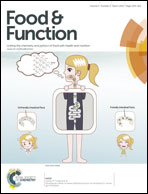The role of green tea extract and powder in mitigating metabolic syndromes with special reference to hyperglycemia and hypercholesterolemia
Abstract
Natural products are currently gaining popularity to combat various physiological threats. Scientific evidence has been provided that dietary phytochemicals may play important roles as chemo-preventive or chemotherapeutic agents in the prevention of many diseases. Green tea has many biologically active moieties, like flavanols and polyphenols. Catechins are flavanols that constitute the majority of soluble solids of green tea; its major components are epigallocatechin gallate (EGCG), epigallocatechin (EGC), epicatechin gallate (ECG) and epicatechin (EC). Among these, EGCG is the predominant component, contributing more than 50% of polyphenols. It has many health related characteristics, like hypoglycemic, hypocholesterolemic, anticancer, antiviral and antihypertensive activities. Ethanolic extracts of green tea was subjected to in vivo modeling. An efficacy trial was carried out on normal, hyperglycemic and hypercholesterolemic rats for 8 weeks. Control, functional and nutraceutical diets were used for each study. Drink and feed intake and body weight increased during the study period. Serum analysis showed that maximum reduction of cholesterol level was noted in hypercholesterolemic rats, up to 15.45%, due to the nutraceutical diet. It was a 21.51% reduction in the case of LDL and 12.92% for triglycerides. The serum glucose level was most reduced in hyperglycemic rats, up to 13.39% as a result of the nutraceutical diet. The functional diet resulted in a bit less reduction in the respective traits compared to the nutraceutical diet. Hematological analysis revealed that administration of green tea did not adversely affect the red blood cell, white blood cell and platelet count of the rats. The current research work enables us to conclude that green tea is effective against hypercholesterolemia and hyperglycemia.


 Please wait while we load your content...
Please wait while we load your content...